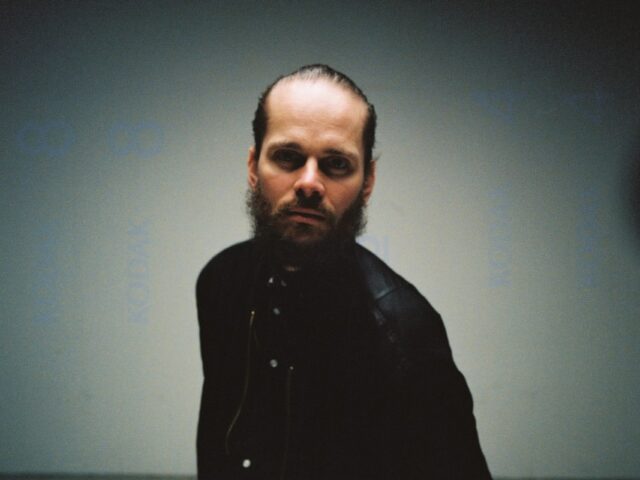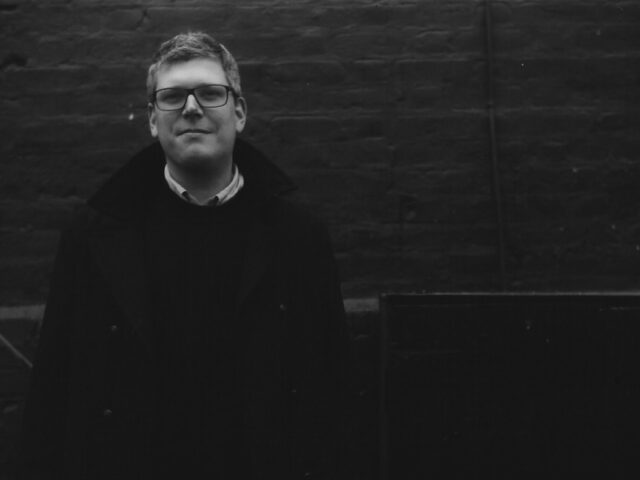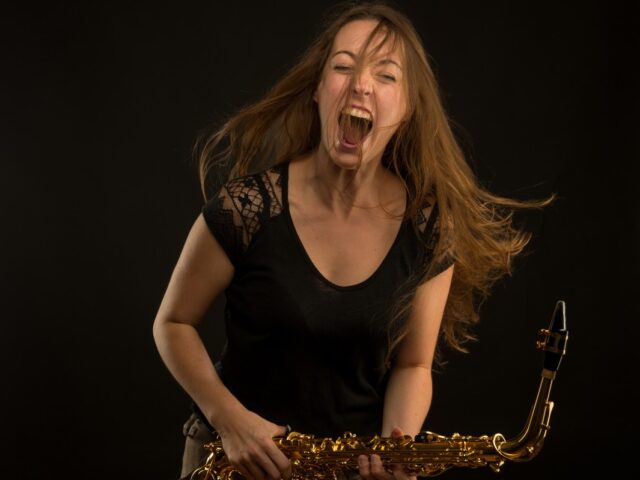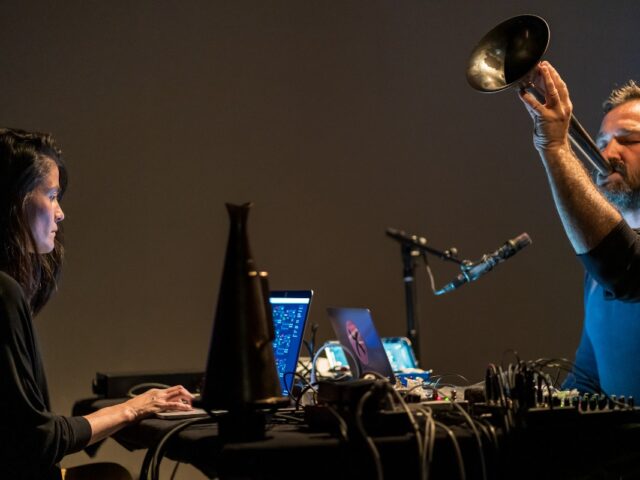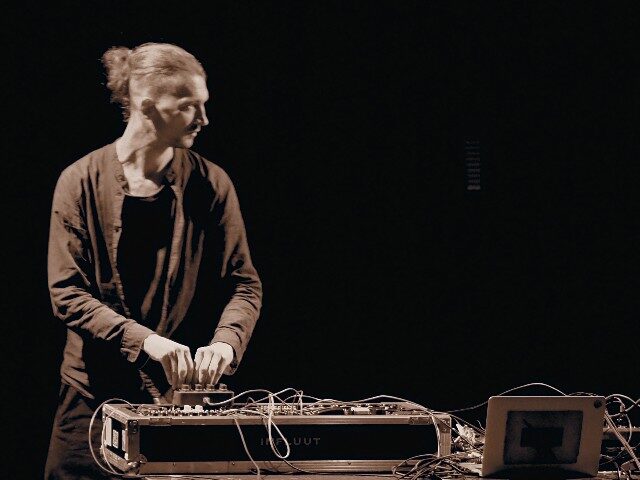RöstiBrücke is a touring project created to promote sound exchange between Swiss linguistic regions. Its aim is to build bridges through concerts in halls throughout Switzerland. 2022 saw the first edition at Cave12 in Geneva and Walcheturm in Zurich; the second edition will take place in 2023 with three partner concert halls: in addition to Studio Foce, the Centre Culturel ABC in La Chaux-de-Fonds and Klappfon in Basel. We talk about this with the project’s founder, Daniel Maszkowicz.
RöstiBrücke is a young project. How did it start? Why did you create it?
RöstiBrücke Electroacoustic Cabaret started right after the pandemic as an attempt to open a space for Switzerland based artists to play in Switzerland. This might sound odd, but it seems actually easier for musicians to connect abroad that in the rest of Switzerland, especially in the field of sound design, and experimental electroacoustic music. The cultural and linguistic barrier is very strong in such a small country, so we must build bridges.
The cabaret concept has quite some many years now. We were organising DIY events in Geneva, inviting various local artist to experiment new sounds and new sets, also profiting to offer a stage to our traveling musician friends from abroad. We hosted experimental music from France, Germany, Poland, even China and Japan. During the pandemic, we held a sort of cabaret event that was entitled RonosTerabak with electroacoustic music and performances. The musicians were close to the public, the communication was easy with an inclusive attitude and mindset. This is what we attempted to export from Geneva to the rest of Switzerland in 2022.
The first edition connected Geneva and Zurich. The second edition will connect Ticino, Basel and La Chaux-de-Fonds. How did you select the locations?
This first edition connected Geneva and Zurich because it was a simple way to test the concept in a city that was not ours, so to say. We sort of had previous contacts with Patrick Huber from Walcheturm, knowing they were hosting events for experimental music and cinema, so it was a good starting point. In Geneva we very well know Sixto Fernando and Marion Innocenzi from Cave12 for hosting such events. From that we worked out a project with a first artistic programme and looked for financial partners from which we had very good response.
With this successful experience, we started looking for other venues for the second edition. La Chaux-de-Fond was suggested by an invited artist from the first edition who wanted to participate in the bridge building and connected us with Yvan Cuche from Centre de Culture ABC. Basel was worked out with Michael Zaugg from Klappfon with whom we had previous collaborations and we arranged a gig with Kaserne. Finally, by keeping some illustrative symbolism, we drilled through Gotthard for reaching Ticino. For this we contacted Alberto Barberis from Oggimusica that very much liked the initiative and we successfully arranged a gig at Studio Foce.
Five musicians from German and French-speaking regions of Switzerland will play at Studio Foce. Who are they? What will we listen to?
Some invited artists already played in the previous edition and happily confirmed this new challenge. The whole programme is constructed in a way that accommodates not only various techniques and genres, but also different ways of using the stage for engaging the public. In all four presented projected there are innovative ways to use classic instruments, such as saxophone, drums, voice, among others. Some project make use of added electronics and computers, some not at all. So in all it will be a very broad programme in terms of music and performance with, as we like say, sound poetry as the only common thread.
Nat Cilia is a musician with origins from jazz and circus world that uses loopers with piano, saxophone and other objects. Vincent Glanzman is a drummer with a broad spectrum in the contemporary art scene, and whose solo performance stages the most playful way to use drums and a microphone. Antoine Chessex is a reknown experimental saxophonist and researcher in sound studies that looks for tiny texture movements in monolithic sound displays. And to close the night, kokhlias и loulan (Olga Kokcharova and Antoine Läng) is a duo playing very poetic music with various filed recordings and megaphones.
What is the best part about connecting music from different linguistic regions?
One of the concepts of RöstiBrücke is to build bidirectional bridges within Switzerland. Therefore our research not only focusses on finding venues but also on finding artists from cities and regions we don’t necessarily know or wouldn’t think of. There is a lot of beautiful encounters and discoveries involved, for the public, the artists, and us organisers. They all open new potentials, new bindings, with an opportunity for growing the community. But the best part is that since we still are a small country, we are all quickly reachable through our incredible national train network.
The future direction of this initiative is still unknown and that’s also beautiful. Will something happen in Graubünden? Will we connect other cities such as Biel, Bern, Lucern? Will we leave the cities to go to the mountain and country side? We are still in the exploratory stage so to say, and we would also like to grow the team by including the artists themselves. Röstibrücke could become a platform linking artists and venues. We therefore don’t want to grow as a curatorial management team, rather a bridge linking initiative with an organic way of inviting artists to connect and present their work.
The project focuses on experimental music. Is Switzerland a good place to create innovative music?
It is a difficult question that would get various answers depending on whom this is asked, and maybe the same question could be asked to any niche music and art with similar answers.
On the negative sides, sound artists that do experiment always have side jobs, music related or not, otherwise it gets a striving exercise. Those experimentations also require a lot of personal work and time for research, you need to know the music rules so you can break them, right? Venues that accommodate innovative music strive for reaching a financial break even due to the fact those specific music genres are not so popular – or not yet. But there are always exceptions.
On the positive side, artistic speaking, the freedom of being out of genre allows to explore and create music that is very rich in emotions and true narrative content. There is a particular sensitivity developed by those exploring artists, that still can find a venue and public in Switzerland. Also, it seems that Swiss institutions do understand innovation in art and music and as a consequence they support it more and more, allowing to get funding for artists directly or organisers of this kind of initiatives. From this point of view, we foresee a future where it might be easier to break the ice between the public and those specific music genres. In any ways those are the goals towards which we work. Let’s see where it goes.
RöstiBrücke is on 08.03 at 20:00 at Studio Foce.
More information: foce.ch
